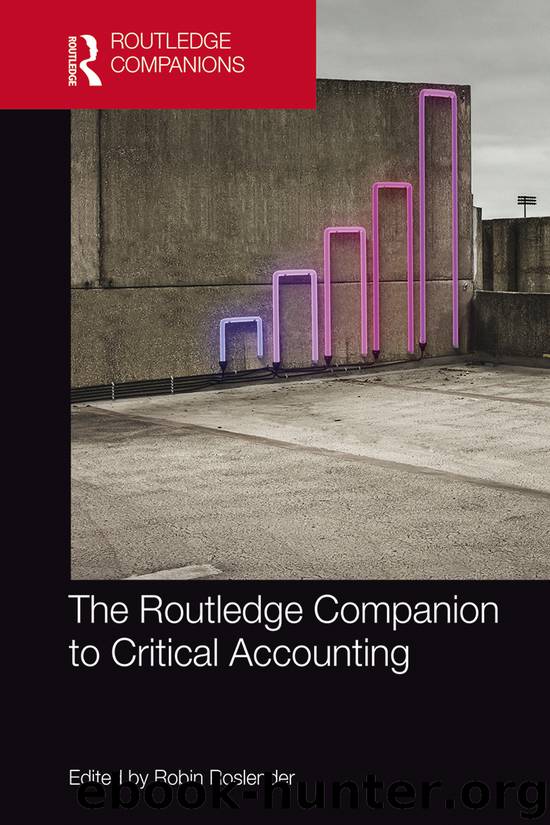The Routledge Companion to Critical Accounting by Roslender Robin

Author:Roslender, Robin
Language: eng
Format: epub
Publisher: Taylor & Francis Ltd
6 Accountability as a core point of focus for future accounting research
Since I first started researching, increased transparency and accountability have become the standard remedies for almost all organisational ills. This period coincided with the adoption of new public management and an ever-increasing dominance of the neo-liberal ideology within which the accountable individual is critical. The instruments of transparency and accountability have since become central not only to private sector organisations but also to both public and third sector organisations as an intended instrument for the realisation of enhanced efficiency, value for money, together with numerous other context-specific key performance indicators. Pessimists see only an ever-increasing prevalence of these instruments (Power, 2015), ensuring that we will all be increasingly plagued and persecuted by these normative traces of our activity. Accountability then is likely to remain a core area of interest for research into the future.
Compared with mainstream accounting research, research on accountability has the peculiar merit of allowing us to explore accounting in use. Whilst mainstream accounting research still clings to the illusion that, with sufficient analytic skill, accounting numbers can be read both as a neutral mirror of the present and the means to render the future reliably predictable, to explore accounting in use opens us to a much more productive and performative view of accounting representations. The numbers participate not only in shaping decisions that have objective effects in the world, but critically they also shape us, the users and our relationships to others. They become the way in which I see or understand not only what I do and its effects, but also what it is to be a self; furnishing me with the standards against which both I and others should judge myself. Accountability makes us as subjects and realises subjection, and its endlessly reiterated routines play powerfully with feelings of greed, fear, hope, success and failure as we see our value reflected in the numbers (Boedker and Chua, 2013). Critically, accountability shapes my sense of my relation to others; it enacts my subjection to some, casts others as competitors or rivals and yet others with the cloak of indifference in the ways in which it leaves me preoccupied only with my securing of ‘my’ results.
Surprisingly, given its centrality, there remains a relative dearth of fine-grained empirical studies of accountability. Of great promise and relevance for accounting research has been the advent of studies which draw upon actor–network theory (ANT). The agency ANT grants to non-human actants allows us to acknowledge and explore very directly, and in fine detail, how our own agency is shaped – or ‘pushed around’ – by accounting numbers and artefacts that have typically been assumed to be the mere servants of human agency (Justesen and Mouritsen, 2011; Robson, 1992). Accounting numbers mediate almost all organisational relationships and herein lies the importance of accounting research. But typically absent in this ANT-inspired research is the human subject or any clear observation of the different potentials of the reflexivity of human and non-humans, such that the agency of accounting is possibly ceded a deterministic, if contingent, power.
Download
This site does not store any files on its server. We only index and link to content provided by other sites. Please contact the content providers to delete copyright contents if any and email us, we'll remove relevant links or contents immediately.
Zero to IPO: Over $1 Trillion of Actionable Advice from the World's Most Successful Entrepreneurs by Frederic Kerrest(4509)
Machine Learning at Scale with H2O by Gregory Keys | David Whiting(4292)
Never by Ken Follett(3937)
Harry Potter and the Goblet Of Fire by J.K. Rowling(3848)
Ogilvy on Advertising by David Ogilvy(3604)
Shadow of Night by Deborah Harkness(3357)
The Man Who Died Twice by Richard Osman(3072)
Book of Life by Deborah Harkness(2930)
The Tipping Point by Malcolm Gladwell(2911)
Will by Will Smith(2907)
0041152001443424520 .pdf by Unknown(2843)
My Brilliant Friend by Elena Ferrante(2824)
Purple Hibiscus by Chimamanda Ngozi Adichie(2822)
How Proust Can Change Your Life by Alain De Botton(2805)
How to Pay Zero Taxes, 2018 by Jeff A. Schnepper(2646)
Hooked: A Dark, Contemporary Romance (Never After Series) by Emily McIntire(2547)
Rationality by Steven Pinker(2352)
Can't Hurt Me: Master Your Mind and Defy the Odds - Clean Edition by David Goggins(2323)
Borders by unknow(2301)
